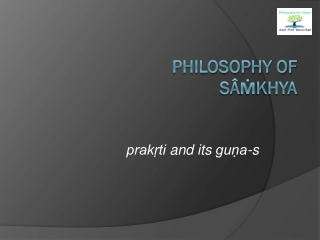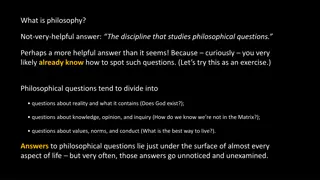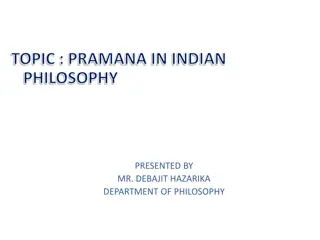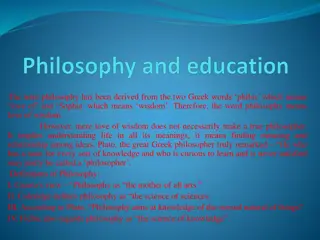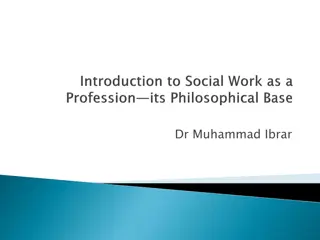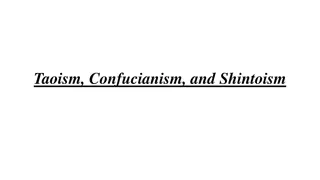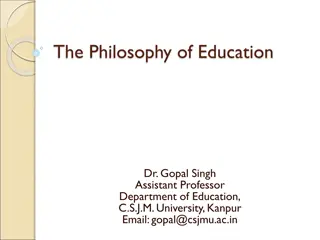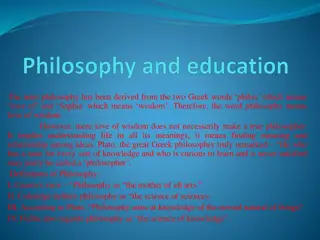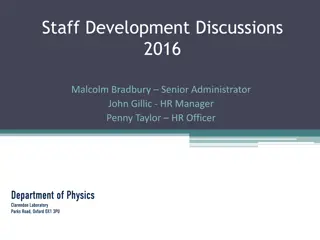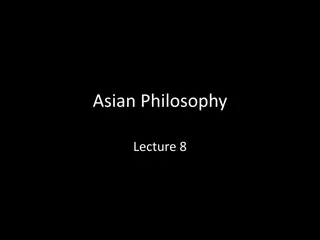Understanding Philosophy: Day 1 Topics and Discussions
Explore the fundamental aspects of philosophy in Day 1 of the course "Possible Worlds" by Cathy Legg at the University of Waikato. Delve into topics such as the relevance of studying philosophy, metaphysics, defining time, and different forms of possibility and necessity. Engage in thought-provoking discussions, analyze philosophical inquiries over centuries, and challenge the perception of philosophy as a discipline with no practical value.
Download Presentation

Please find below an Image/Link to download the presentation.
The content on the website is provided AS IS for your information and personal use only. It may not be sold, licensed, or shared on other websites without obtaining consent from the author. Download presentation by click this link. If you encounter any issues during the download, it is possible that the publisher has removed the file from their server.
E N D
Presentation Transcript
Possible Worlds Cathy Legg University of Waikato
Day 1 TOPICS Why Study Philosophy? What is Metaphysics? Defining Time Defining Possibility Logical possibility / necessity Physical possibility / necessity Epistemic possibility / necessity
Why Study Philosophy? What is Metaphysics? Defining Time Defining Possibility Day 1 Many of you guys are aspiring to be researchers Really great research requires training in precise, accurate, rigorous thought Really great research also requires training in speculative, creative, imaginative thought This course is designed to uniquely foster the second kind of thinking, whilst not neglecting the first
Why Study Philosophy? What is Metaphysics? Defining Time Defining Possibility Day 1 Our Tools: Good ideas from smart philosophers throughout history Formal logic (there will be a series of logic links through the course, with some exercises to do if interested) Thought experiments (a.k.a. Possible worlds) Class discussions Open-ended questions. Some people, particularly those trained in exacting detail-oriented thinking, can find that large open- ended questions make them feel very uncomfortable. If this applies to you, it s ok, it s natural. Just don t panic! Bertrand Russell: philosophy "keeps alive our sense of wonder by showing familiar things in an unfamiliar aspect".
Why Study Philosophy? What is Metaphysics? Defining Time Defining Possibility Day 1 But isn t philosophy just a bunch of unanswerable questions? Answer taken from: http://www.uri.edu/personal/szunjic/philos/whystudy.htm The inability of philosophy to produce positive and applicable knowledge gives rise to the view that it is a "useless" pursuit. In comparison with other fields of human knowledge, particularly applied sciences, philosophy really seems to be deprived of any practical value and effectiveness. This is generally regarded as its most serious defect, especially nowadays when everybody values usefulness and effectiveness. Einstein: "People like chopping wood, because it shows immediate results.
Why Study Philosophy? What is Metaphysics? Defining Time Defining Possibility Day 1 Here is an argument: For 2000 years philosophers have inquired into philosophical questions and not agreed on their answers. PREMISE 1 If people inquire long and diligently into questions but don t agree on their answers, then those questions must have no clear answers. PREMISE 2 Questions which have no clear answers are pointless to inquire into. PREMISE 3 Therefore it is pointless to inquire into philosophical questions. CONCLUSION Question: Is this a good argument? Why or why not?
Why Study Philosophy? What is Metaphysics? Defining Time Defining Possibility Day 1 Metaphysics is one of the most fundamental areas of philosophy. It deals with what is in the most fundamental sense. We can say that it is the science of being. What kinds of questions could we ask about being? Here are two really fundamental ones: 1) What is the Universe made of, at the most general level? Times? Spaces? Persons? Events? Physical Objects? Causes? Ideas? 2) What kinds of relationships do those entities have?
Why Study Philosophy? What is Metaphysics? Defining Time Defining Possibility Day 1 The vexed issue of naturalism Some people (including some philosophers) believe that, these days, answering the questions on the last slide should be left to natural science. However, others (including many other philosophers) believe that underneath the specific questions answered by the natural sciences via experiment and scientific theory, lie other, deeper questions which can only be answered by using reason and imagination (in other words, speculative thought). This will be our approach.
Why Study Philosophy? What is Metaphysics? Defining Time Defining Possibility Day 1 Time has always been one of the most mysterious and fascinating metaphysical topics Exercise: Defining time (groups of ~3) 1) Write a definition of time (!). What kind of thing is it? (N.B.: make sure the definition you come up with would not equally apply to space! Because if so, you haven t really defined time, have you? ) 2) What is it that makes now (i.e. the present moment) now?
Why Study Philosophy? What is Metaphysics? Defining Time Defining Possibility Day 1 What St Augustine (famously) said about time: What then is time? If no one asks me, I know: if I wish to explain it to one that asks, I know not. Confessions, 11.14.17 or, in other words I always used the concept before with no trouble, but now I try to define it, I find I can t WTH?
Why Study Philosophy? What is Metaphysics? Defining Time Defining Possibility Day 1 The word possible has been found by philosophers to have more than one meaning. We begin with: Logical Possibility To say that p (i.e. some proposition) represents a situation which is logically possible, is to say that p contains no logical contradiction. Logical contradictions may be very obvious: e.g.: P1:Paris is the capital of France and Paris is not the capital of France. Logic link: Logical structure P1: (p & ~p) Or contradictions may be not so obvious, e.g.: P2: No kittens are black and Fluffy is black and Fluffy is a kitten. Logic link: What is the logical structure of P2?
Why Study Philosophy? What is Metaphysics? Defining Time Defining Possibility Day 1 A philosopher who is trained in formal logic can sometimes do useful work in pointing out logical contradictions that are not immediately obvious. Sometimes, in order to expose the logical contradiction, you need to make explicit the meanings of some of the words in the propositions. E.g. the following represents a situation which is not logically possible: P3: Trista is a bachelorette and Trista is married. Logic link: represent P3 in formal logic The logicalstructure here does not seem to be contradictory. But it is part of the meaningof bachelorette that the person isn t married. We could add to our logical system a rule which exposes the contradiction, if we wanted. (How?)
Why Study Philosophy? What is Metaphysics? Defining Time Defining Possibility Day 1 Exercise: Do the following propositions represent logically possible situations? i) Wellington is the capital of New Zealand. ii) Auckland is the capital of New Zealand. iii) Pigs fly. iv) At exactly 3 p.m. on 4th March 2003, Bob was in Hamilton and at exactly 3 p.m. 14th March 2003, Bob was in Shanghai. v) At exactly 3 p.m. on 4th March 2003, Bob was in Hamilton and Bob was in Shanghai. vi) [hard] Water is not H2O. vii) [hard] Parallel lines meet each other.
Why Study Philosophy? What is Metaphysics? Defining Time Defining Possibility Day 1 Physical Possibility To say that p (i.e. some proposition) represents a situation which is physically possible, is to say that p is consistent with the laws of nature. Thus, the following is physically possible: P4: Cathy drops a pen in her bedroom under normal conditions and it falls to the floor. The following is not physically possible: P5: Cathy drops a pen in her bedroom under normal conditions and it flies up to the ceiling. P5 is inconsistent with Newton s 2nd law of gravity.
Why Study Philosophy? What is Metaphysics? Defining Time Defining Possibility Day 1 So a proposition can describe a situation that is logically possible (because it contains no internal logical contradiction) but is physically impossible (because it is inconsistent with a law of nature). E.g.: P6: Mel Gibson jumps out of a tenth story window, lands on the ground, and is uninjured. P7: Mel Gibson holds a piece of iron in his hand and it turns to gold. Question: Does the reverse hold? Is it possible for a proposition to describe a situation that is physically possible but logically impossible?
Why Study Philosophy? What is Metaphysics? Defining Time Defining Possibility Day 1 Answer:No. Here is the reason (consider the ovals as sets of possible worlds ) Logically possible Physically possible loActual Question: Where should epistemic possibility be drawn on this model?
Why Study Philosophy? What is Metaphysics? Defining Time Defining Possibility Day 1 Logically possible Physically possible lo Actual I am not a trained physicist, so I cannot tell you much about what is physically possible. However, this diagram shows the role which philosophy can have nonetheless in clarifying what is possible. If something is not logically possible we know it is not physically possible.
Why Study Philosophy? What is Metaphysics? Defining Time Defining Possibility Day 1 Exercise: Do the following propositions represent situations that are logically possible and physically possible, logically possible and physically impossible, or logically impossible? (Think carefully ) i) Henry VIII had 3 sons ii) Henry VIII s oldest child was a son and Henry VIII s oldest child was a daughter. iii) The moon is made of green cheese
Why Study Philosophy? What is Metaphysics? Defining Time Defining Possibility Day 1 Epistemic Possibility - Whereas physical possibility consists in consistency with the laws of nature, to say that p is epistemically possible is to say that it is consistent with what weknow. - Hopefully it should be obvious why we need a distinction between physical and epistemic possibility (Why?) -Thus the following are physically possible but in the 19th century were not epistemically possible (at least in Western society): P8: Ships can be built out of metal. P9: Matter can disappear altogether. Question: Can you think of any more examples of epistemic impossibilities (for us)? Can you think of an example of something which is physically possible but epistemically impossible?
Why Study Philosophy? What is Metaphysics? Defining Time Defining Possibility Day 1 Exercise:Logically possible/impossible, physically possible/ impossible, epistemically possible/impossible? (And why?) i) A cat flies to the moon without a spaceship ii) The youngest child cooks for everyone in the family. iii) The youngest child cooks for everyone in the family who doesn t cook for themselves
Why Study Philosophy? What is Metaphysics? Defining Time Defining Possibility Day 1 Kinds of Necessity Each of the varieties of possibility outlined above has its own corresponding version of necessity: p is logically possible: according to the laws of logic it might be true. p is logically necessary: according to the laws of logic it must be true. p is physically possible: according to laws of nature it might be true. p is physically necessary: according to laws of nature it must be true. p is epistemically possible: according to our knowledge it might be true. p is epistemically necessary: according to our knowledge it must be true. There is a more general term which covers all the concepts of possibility and necessity outlined above: modality . Modality is a rich area of study within philosophy (especially metaphysics and epistemology).
Why Study Philosophy? What is Metaphysics? Defining Time Defining Possibility Day 1 Kinds of Necessity Each of the varieties of possibility outlined above has its own corresponding version of necessity: p is logically possible: according to the laws of logic it might be true. p is logically necessary: according to the laws of logic it must be true. p is physically possible: according to laws of nature it might be true. p is physically necessary: according to laws of nature it must be true. p is epistemically possible: according to our knowledge it might be true. p is epistemically necessary: according to our knowledge it must be true. There is a more general term which covers all the concepts of possibility and necessity outlined above: modality . Modality is a rich area of study within philosophy (especially metaphysics and epistemology).
Why Study Philosophy? What is Metaphysics? Defining Time Defining Possibility Day 1 Logic Link: Modality is also a rich area of study in formal logic. Quantified Modal Logic provides a structured way of thinking through issues to do with possible worlds, and even doing proofs involving different possible worlds. Key Idea: Unify the necessity operator: with the universal quantifier: Unify the possibility operator: with the existential quantifier: Thus: It s necessarily true that all cats are grey In all possible worlds all cats are grey It s possible that some cats are grey There is at least one possible world where at least one cat is grey. However the relationship between the different flavours of modality (the logical, physical, epistemic which we have touched on, and others such as deontic) is very much an open frontier in logical research.
Why Study Philosophy? What is Metaphysics? Defining Time Defining Possibility Day 1 Philosophical Homework for Tomorrow: Read these stories: Ray Bradbury, A Sound of Thunder : http://www.onebee.com/writing/2005/07/sound_of_thunder Robert Heinlein, By His Bootstraps : http://www.xs4all.nl/~pot/scifi/byhisbootstraps.pdf Decide whether they are: logically possible/impossible physically possible/impossible epistemically possible/impossible.
Why Study Philosophy? What is Metaphysics? Defining Time Defining Possibility Day 1 FURTHER READING: Philosophy: Susan Schneider (ed), Science Fiction and Philosophy (Wiley- Blackwell, 2009). [Introduction good on science fiction as a window into philosophical puzzles . Goes on to provide great story-philosophy links.] Bertrand Russell, The Value of Philosophy , http://www.skepdic.com/russell.html Michael Loux, Introduction , The Possible and the Actual (Cornell, 1997). [Lays out the possible worlds approach to metaphysics in detail, however pretty chewy ] Logic: James Garson, Modal Logic , Stanford Encyclopedia of Philosophy, http://plato.stanford.edu/entries/logic-modal/ Rod Girle, Modal Logics and Philosophy (McGill-Queens, 2000) [extremely clear and well put-together]



